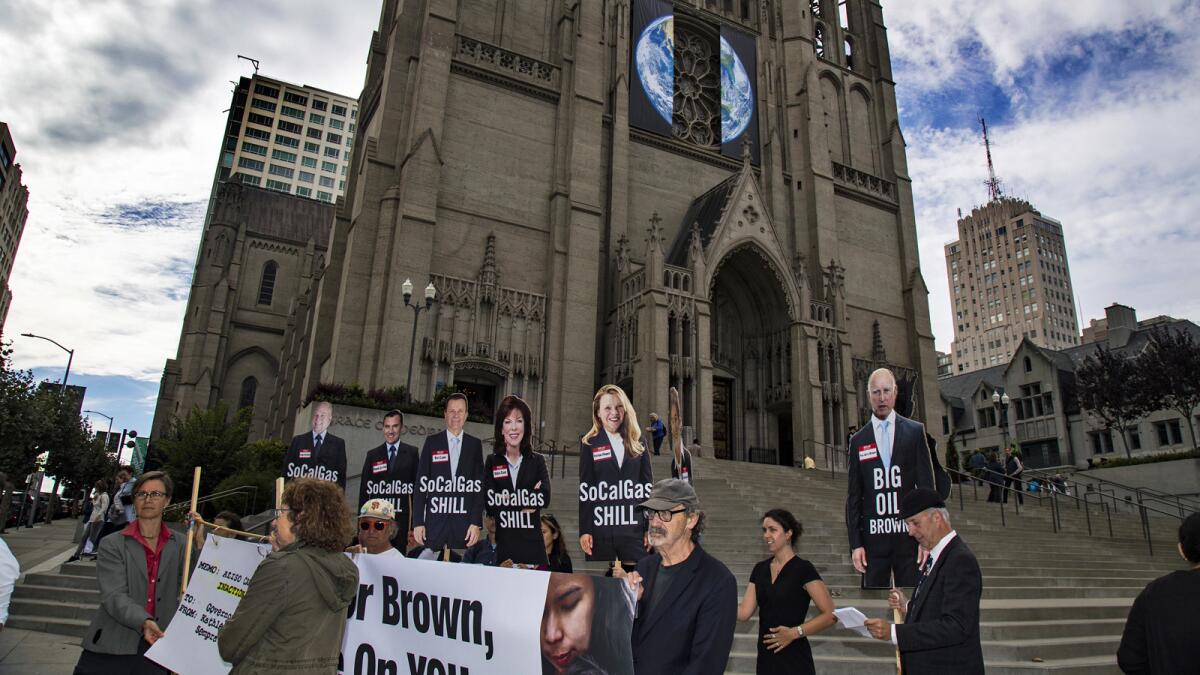Capitol Journal: Jerry Brown may not be the ultimate climate crusader, but he’s a lot closer than most politicians

- Share via
Reporting from Sacramento — Gov. Jerry Brown is unquestionably one of America’s most outspoken climate warriors. Yet in his own state, activists protest that he’s an overrated slacker. That’s quintessential left-coast California.
Even though the governor is outspoken, his critics say, it doesn’t mean he isn’t a softie on some polluting industries, especially oil.
But Brown should be grateful: At least he’s being picketed at his Global Climate Action Summit in San Francisco by people on his side. They’re not climate deniers like President Trump, who contends that human-caused global warming is a hoax.
They’re just pushing him to be tougher and match his rhetoric with deeds, the protesters say. And they’re a bit nasty about it.
“Jerry Brown has positioned himself as a climate leader, warning of ‘extinction’ and ‘existential threat’ at climate conferences around the globe,” the leftist Consumer Watchdog organization said in a statement issued Tuesday on the eve of the conference. “But his record as governor tells a different story….
“Politicians like Gov. Brown who give lip service to the climate crisis while continuing to serve the fossil fuel industry will be challenged rather than celebrated.”
The organization ran a 30-second TV spot in San Francisco during the conference, showing a 9-year-old girl calling the governor “cruel and heartless” for allowing children to live near polluting oil rigs.
Hundreds of protesters representing several environmental groups planned to picket the George R. Moscone Convention Center, where roughly 4,500 delegates from around the globe will hear celebrity speakers, such as Brown, on Thursday and Friday. A few dozen demonstrated at the conference’s opening ceremony at Grace Cathedral on Wednesday afternoon.
Brown wasn’t saying much about the protesters or their accusations. Spokesman Evan Westrup had a brief stock comment.
“Clearly the world needs to curb its use of oil,” Westrup said, “and the phase-out is already underway in California, where the state is committed to cutting consumption in half. At the same time, all production in California has dropped 56%.
“There’s a reason the White House and fossil fuel companies fight California on almost a daily basis,” he continued. “No jurisdiction in the Western Hemisphere is doing more on climate.”
So what are the protesters’ gripes?
For one thing, they complain that since Brown has become governor again, his administration has issued more than 21,000 oil and gas drilling permits. They include 238 for offshore waters, mostly around Long Beach.
That’s true, the administration says, but the number has dropped off sharply in the last three years — from 4,497 in 2015 to 1,924 since then.
In fact, California has fallen from its longtime position as the No. 3 oil-producing state to No. 6.
Still, there’s this from Adam Scow, California director of Food & Water Watch, who protested at the opening ceremony: “Jerry Brown goes over to the Vatican and hangs out with the pope and says, ‘We’re going to leave oil in the ground,’ then refuses to exercise his power as governor to limit the industry….
“‘Hypocrite’ is a nice word for Jerry Brown, almost too nice a word.”
Coverage of California politics »
But would it make sense for California to ban new drilling and phase out oil production? No, says Severin Borenstein, faculty director at a UC Berkeley energy institute.
“California would take a large economic hit for a small reduction in emissions” of greenhouse gases, he wrote in a recent Times op-ed piece.
Consumer Watchdog also complains that “more than 5.4 million Californians live within a mile of at least one oil or gas well,” and “hundreds of thousands of children” go to school or reside mere feet from drilling operations. “Many suffer illness from toxic exposure,” the organization says.
It advocates requiring a 2,500-foot buffer — nearly half a mile — between oil drilling and residents.
Maybe that’s ideal, but it’s not practical in Southern California. The oil industry largely nourished the region’s growth from the late 1800s into the 1940s. Oil rigs are everywhere, and they’re still producing.
OK, says Jamie Court, president of Consumer Watchdog. “Brown could at least require neighborhood setbacks for future drilling. He refuses to draw any blood from the oil industry.”
Additionally, protesters object that Brown hasn’t tried to ban fracking, a controversial drilling technique that uses a high-pressure mixture of water, sand and chemicals to loosen oil deep underground. Environmentalists fear pollution of groundwater.
Brown signed a fracking regulation bill five years ago that activists consider extremely weak. But it’s all that could pass the Legislature after heavy lobbying from the oil industry.
The governor has been a political practitioner for decades — winning a lot more than he has lost — and knows when not to buck a powerful industry that donates millions to candidates. In fact, he and his causes have received a few million oil bucks.
By any objective scorecard, however, Brown and the Legislature deserve “A” grades for enacting measures to reduce greenhouse gas emissions.
The last landmark bill Brown signed sets a goal of California deriving all its electricity from clean power sources by 2045. Right before that he signed legislation to block any new offshore oil drilling the Trump administration might approve.
Brown might not be the shining, courageous climate crusader he’s often made out to be, but he’s a lot closer than just about anyone else in high public office.
Follow @LATimesSkelton on Twitter
More to Read
Get the L.A. Times Politics newsletter
Deeply reported insights into legislation, politics and policy from Sacramento, Washington and beyond. In your inbox three times per week.
You may occasionally receive promotional content from the Los Angeles Times.











